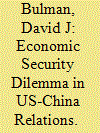| Srl | Item |
| 1 |
ID:
177645


|
|
|
|
|
| Summary/Abstract |
China and the United States are caught in an economic security dilemma. In response to perceived economic aggression,
both countries now feel impelled to bolster domestic economic security through protectionist and retaliatory measures that the other side perceives as threatening. In game
theoretic terms, a mutually beneficial “Stag Hunt” coordination game devolved into an uncooperative “Prisoner’s Dilemma” after the global financial crisis. In the economic security dilemma that emerged under Trump and Xi, both sides
unsuccessfully attempted to coerce opponent behavior, further harming both economies. Using a game framework—as
opposed to a structural or leadership-based account—helps
demonstrate that China’s recent reform reversal and revisionist approaches to the international economic order were
not unavoidable parts of a long-term strategy, but rather developed partially as a response to perceived US aggressions.
|
|
|
|
|
|
|
|
|
|
|
|
|
|
|
|
| 2 |
ID:
180461


|
|
|
|
|
| Summary/Abstract |
Xi Jinping’s anti-corruption drive, personnel reshuffles, and institutional overhauls seem to mark a turning point in Beijing’s long-running fight against ‘localism’ (difangzhuyi). Yet, key questions remain about the scope and effectiveness of efforts to rein in China’s subnational officials. Has the Xi administration effectively combated localism by appointing more outsiders to provincial leadership teams? Or have strengthened oversight institutions made subnational officials more responsive to the center regardless of their individual backgrounds? To address these questions, this article distinguishes between different types of localism in contemporary China and the varying personnel ‘risk factors’ underlying them. Comparing the makeup of provincial party standing committees under Xi Jinping’s 18th CPC Central Committee (2012–2017) with those from the 15–17th CPC Central Committees under Jiang Zemin and Hu Jintao (1997–2012), the analysis finds that Xi has accelerated personnel changes to address multiple forms of localism. At the same time, gaps in governance outcomes between local cadres and outsiders have faded since 2012 in several domains, implying that Xi-era institutional reforms have also played a role in curbing localism. Even under Xi, however, important personnel risk factors for localism have persisted and in some domains local-outsider differences in governance outcomes have actually increased.
|
|
|
|
|
|
|
|
|
|
|
|
|
|
|
|